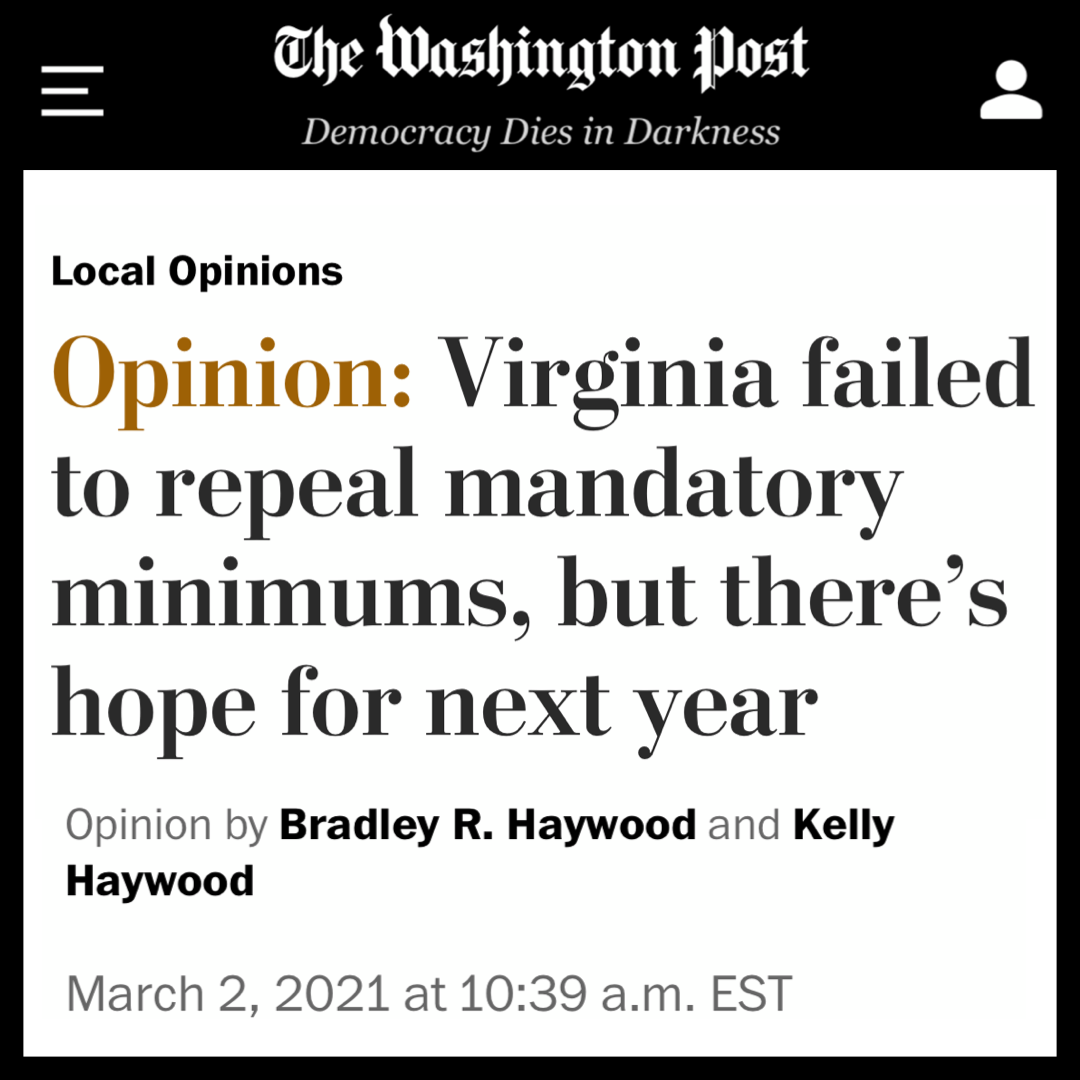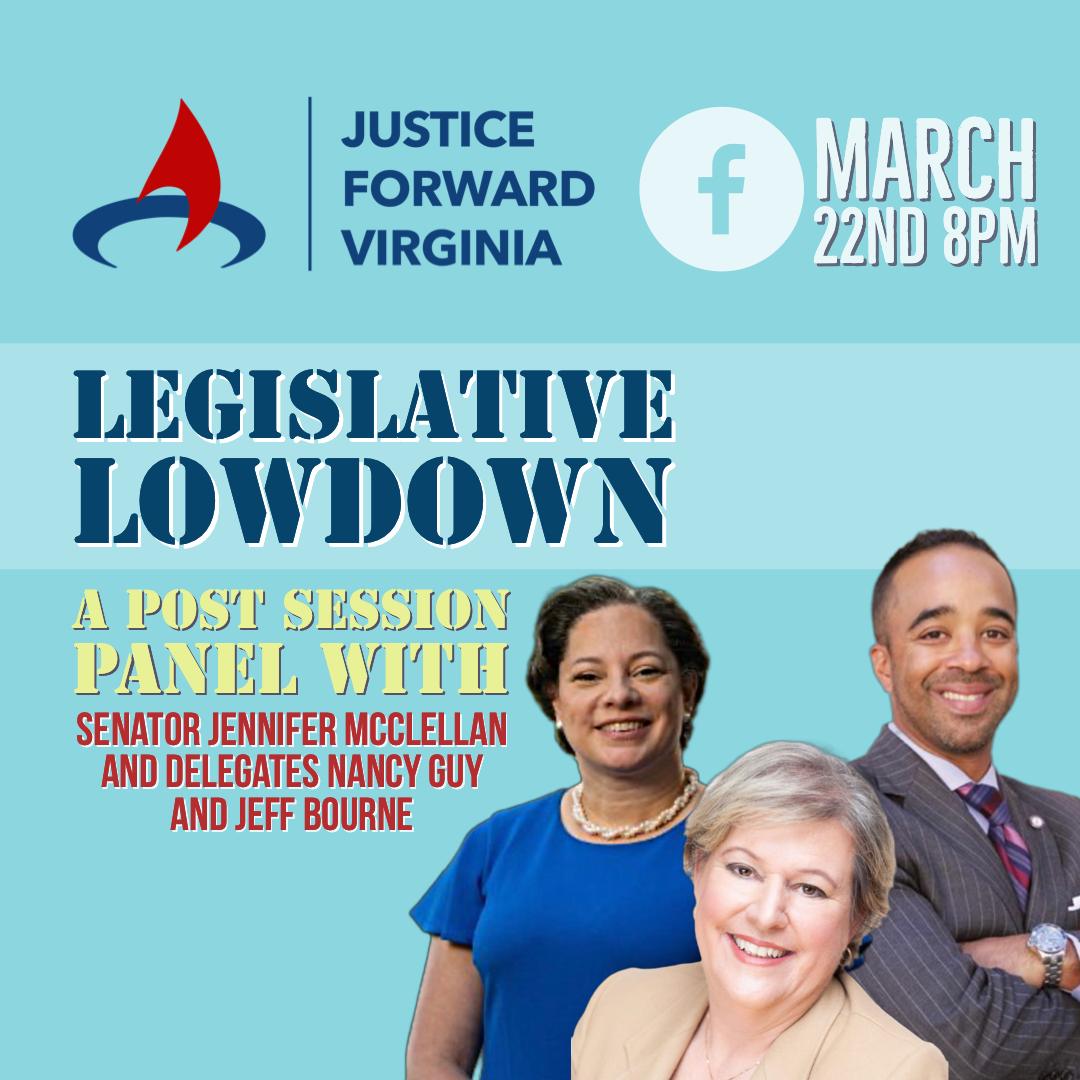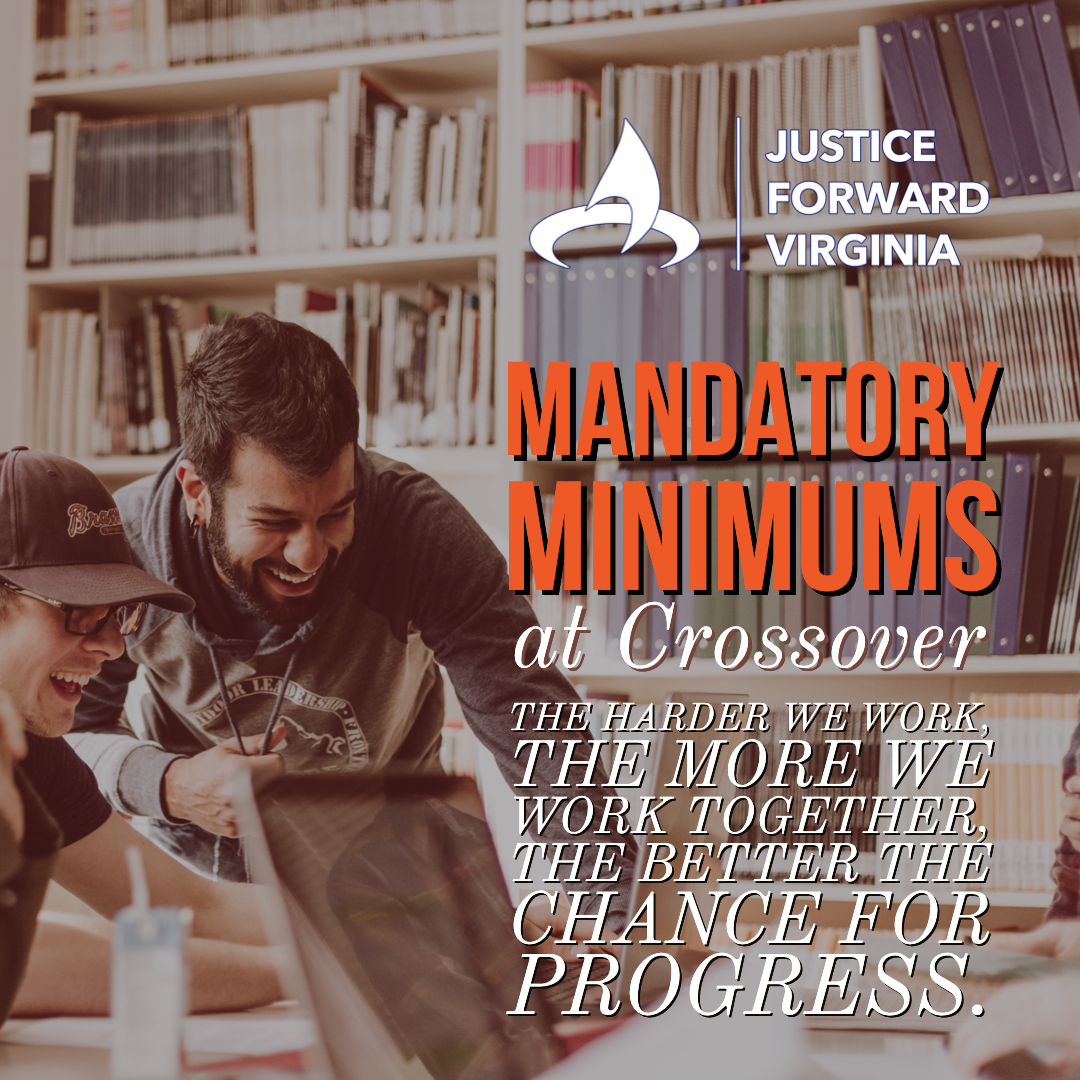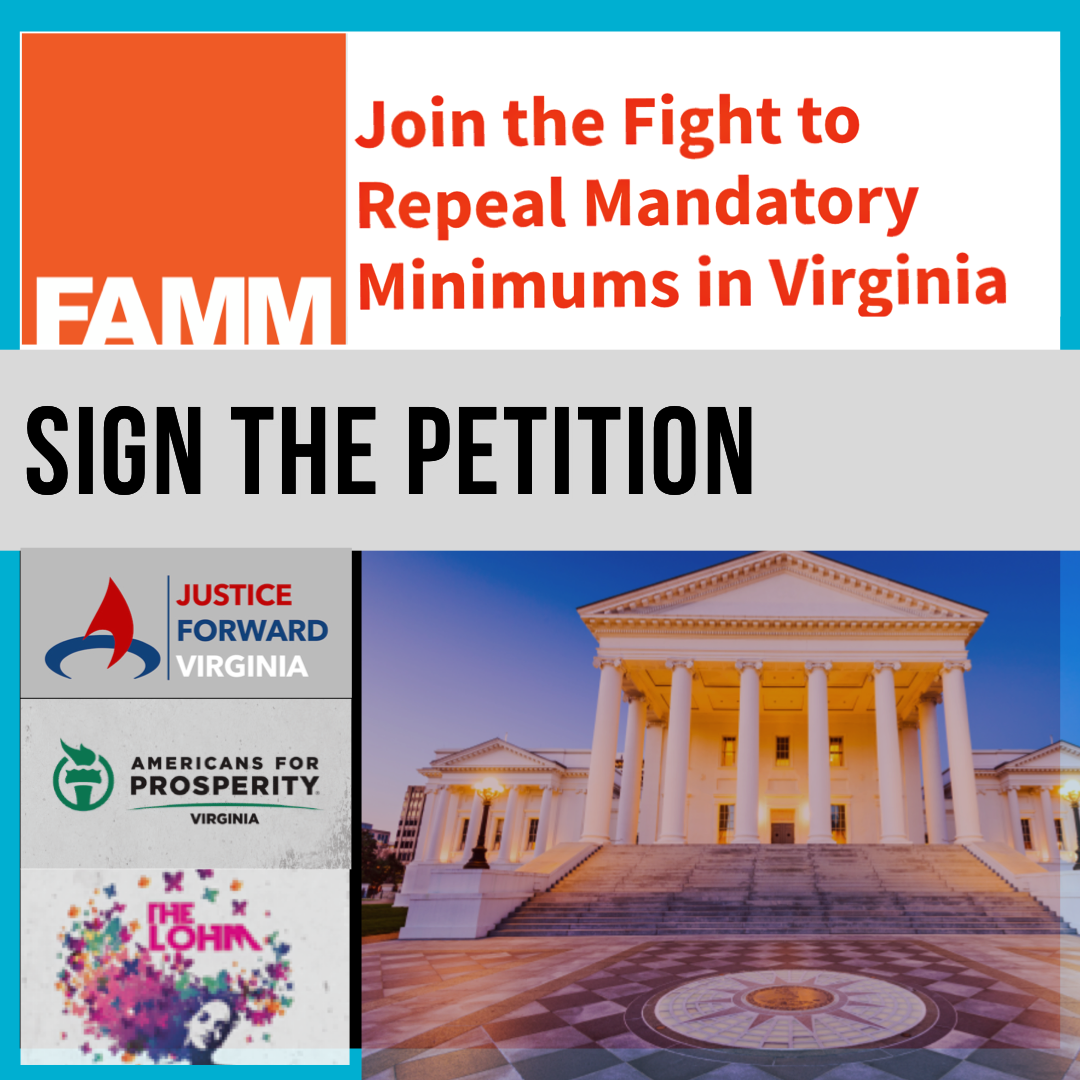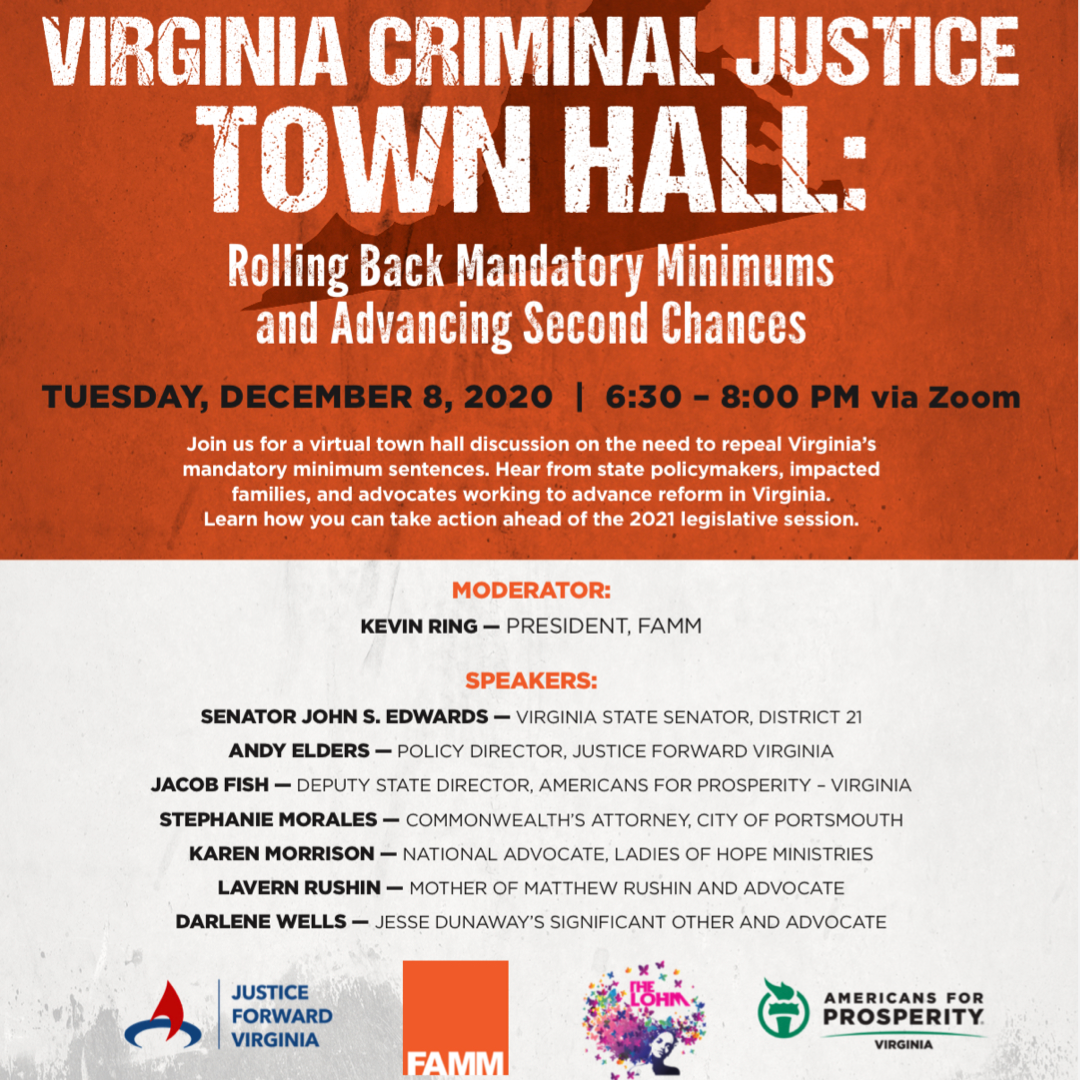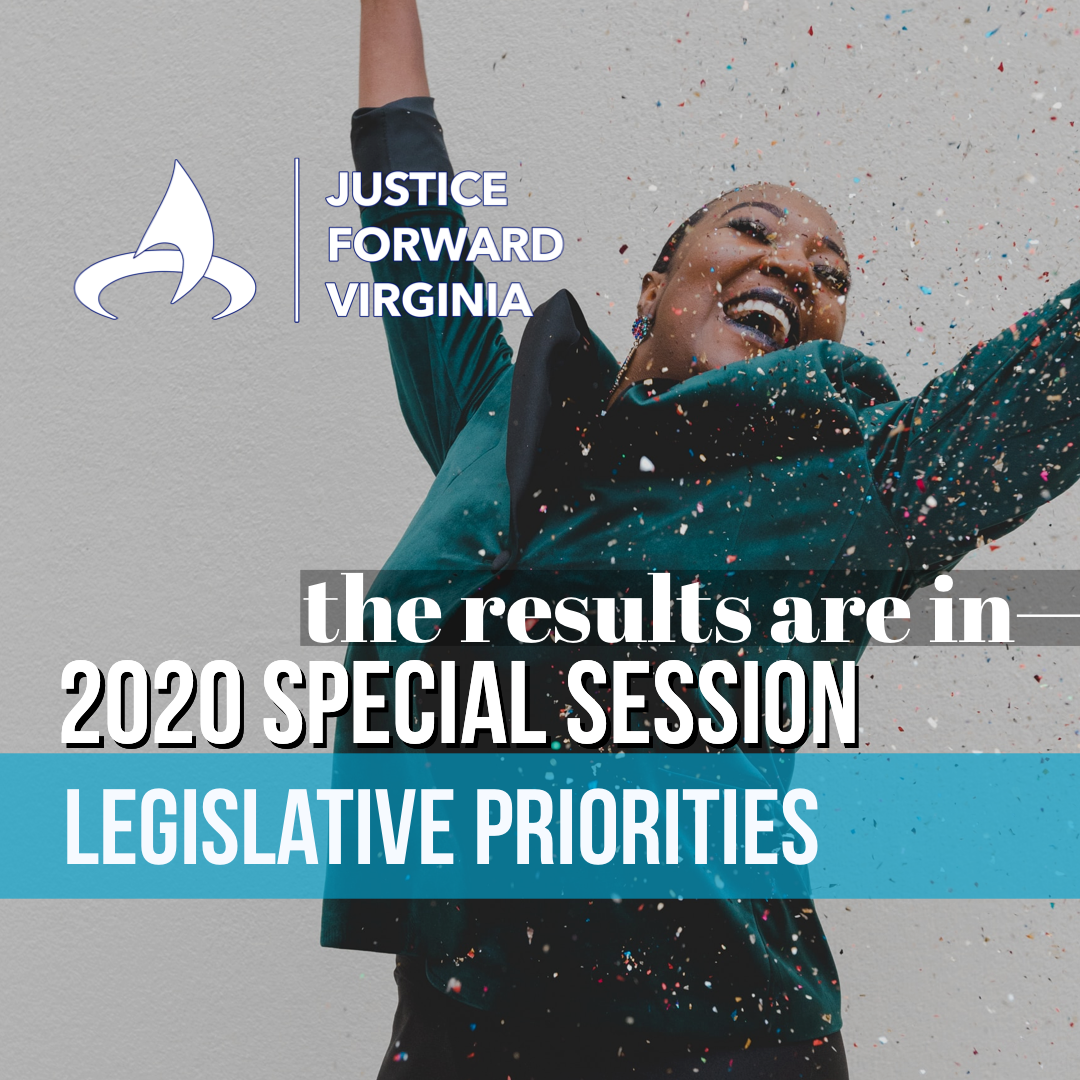Mandatory Minimums and Racial Justice
Mandatory Minimum Sentences: Fuel Powering the Engine of Mass Incarceration
Mass incarceration is a particularly significant problem in the Commonwealth of Virginia. According to data compiled by the Vera Institute of Justice, in 2015 Virginia had locked up almost 60,000 people, an increase of nearly 300% since 1983. Virginia ranked first among Southeast states in jail population per capita and third in prison population per capita. African Americans made up 53% of the prison population, but just 20% of the population at large.
One of the major drivers of mass incarceration has been the rise of laws requiring mandatory minimum sentences, which became popular beginning in the latter part of the twentieth century. Originally touted as a tool to deter serious crime and eliminate sentencing disparities, mandatory minimum sentences have had no measurable impact on deterrence and have coincided with the mass incarceration of African American citizens. For that reason, many states are doing away with mandatory minimum laws, particularly for non-violent drug offenses. The Commonwealth of Virginia should do the same.
What is a mandatory minimum sentence? Under Virginia law, a mandatory minimum sentence is the minimum period of incarceration that a judge must impose against a defendant convicted of an offense. The judge cannot suspend any portion of the sentence, and must impose this minimum sentence regardless of the facts or circumstances of the offense, or the defendant’s personal or criminal history. See Va. Code § 18.2-12.1 (“‘‘Mandatory minimum’ wherever it appears in this Code means, for purposes of imposing punishment upon a person convicted of a crime, that the court shall impose the entire term of confinement, the full amount of the fine and the complete requirement of community service prescribed by law. The court shall not suspend in full or in part any punishment described as mandatory minimum punishment.”).
Virginia enacted its first mandatory minimum law in 1968, and today Virginia has dozens of mandatory minimum laws that apply to a wide range of offenses. For example:
Convictions for distributing controlled substances require the imposition of mandatory minimum sentences ranging from three years to life imprisonment. See Va. Code § 18.2-248.
Convictions for distributing marijuana to someone under 18 require the imposition of mandatory minimum sentences ranging from two to five years. See Va. Code § 18.2-255.
Convictions for lawfully possessing a firearm while unlawfully possessing a Schedule I or II controlled substance require the imposition of mandatory minimum sentences ranging from two to five years. See Va. Code § 18.2-308.4.
Convictions of certain felons for merely possessing a firearm require the imposition of mandatory minimum sentences ranging from two to five years. See Va. Code § 18.2-308.2.
Excessive sentences with no consideration of mitigating factors. Traditionally, judges weigh the facts and circumstances of a particular case and the defendant’s personal and criminal history in arriving at a just sentence. Their job is to make sure the “punishment fits the crime.” Mandatory minimum laws remove this power from judges, and require them to impose a minimum period of incarceration no matter what the facts are. Instead of requiring judges to make sure the punishment fits the crime, these laws require judges to take a “one size fits all” approach to sentencing. Under Virginia law, a volunteer firefighter with no criminal history, who took one Oxycodone tablet from his mother’s medicine cabinet and put it in his room, where he also kept his lawfully registered rifle, would be incarcerated for two years upon conviction. Similarly, a college student with no criminal history who gave her 17-year old brother a marijuana cigarette while she was home on break would serve a two-year sentence upon conviction. These sentences do not “fit the crime”; they are unfair and excessive.
Elimination of judicial checks and balances. Checks and balances are an important foundation of our criminal justice system. The Commonwealth Attorney decides who to charge with a crime and what charges to bring. Judges, however, decide what sentence to impose upon conviction. In doing so, they serve as a check against overly aggressive or unfair charging decisions by the Executive Branch. In the hypothetical cases of the volunteer firefighter and the college student described above, without mandatory minimum laws, judges could impose fair sentences without any period of incarceration. Mandatory minimum laws eliminate that check. This is particularly important because judges, who are not directly elected by popular vote in Virginia, are more insulated from political pressure, and have freedom to do justice without regard to re-election. Commonwealth Attorneys by contrast must run for re-election every four years, and being tough on crime has always been a good campaign promise.
No measurable impact on deterrence. One of the major reasons articulated in support of the mandatory minimum movement was that such laws would deter crime and reduce crime rates. Studies, however, do not support the deterrence rationale. The Virginia State Crime Commission determined that most “peer reviewed studies have not established any long-term deterrent effects directly resulting from the passage of a mandatory minimum statute.” Virginia State Crime Commission, Mandatory Minimum Crimes, at 1 (2007). Similarly, the National Research Council concluded that “the “overwhelming weight of the evidence, however, shows that they have few if any deterrent effects. Analyses finding deterrent effects typically observe, as we do in Chapter 5, that existing knowledge is too fragmentary or that estimated effects are so small or contingent on particular circumstances as to have no practical relevance for policy making.” National Research Council, The Growth of Incarceration in the United States: Exploring Causes and Consequences, at 83 (2014).
Mandatory minimum laws have coincided with the mass incarceration of African Americans. As explained above, mandatory minimum laws began surging in the latter part of the twentieth century. This surge coincided with the mass incarceration pandemic, which has been particularly harsh on African Americans. According to the Vera Institute of Justice, between 1978 and 2017, the incarceration rate of African Americans has increased by 121% in Virginia prisons. Nationally, the absolute racial disparity of prison admission and imprisonment was 465 in 1980, 1,018 in 1990, and 1,487 in 2000. See National Research Council, The Growth of Incarceration in the United States: Exploring Causes and Consequences, at 58 (2014). Although the disparity declined to 1,252 in 2010, the imprisonment rate for African Americans was still 4.6 times that of whites. See id. Mandatory minimum sentences have exacerbated the higher rates of African American imprisonment.
States are rolling back mandatory minimum laws. Recognizing the disparate impact that overly harsh and inflexible mandatory minimum laws have had on the African American community, many states are rolling back these laws. For example, Michigan, New York, Rhode Island, Colorado, South Carolina, Arkansas, Delaware, Ohio, Georgia, Massachusetts, Missouri, Oklahoma and Georgia have reduced or eliminated mandatory minimum sentences for non-violent drug offenses. See New Jersey Criminal Sentencing and Disposition Commission Annual Report, at 22 (November 2019). Studies conducted in Michigan and Rhode Island following the repeal of mandatory minimum laws for drug offenses showed a decline in crime rates and significant cost savings. See id.
Mandatory minimum laws have not achieved their objectives, and have contributed to the mass incarceration of African Americans. The time has come for the legislature to erase those laws from the books.
Legislative History
During the 2021 Session, Senator Edwards patroned a bill (SB 1443) supported by JFV that would have eliminated almost all Mandatory Minimums. A separate bill was introduced in the House that only eliminated some mandatory minimums (primarily focused on drug convictions). While the House passed the House version of the bill and the Senate passed the Senate version of the bill, the conferees couldn’t come to language they all agreed on. There was never a vote on final language. This bill was one of JFV’s highest priorities for 2021, and it is truly disappointing that despite stating again and again that this was a priority for legislators, no legislation passed this session.
This article was authored by Toby Romero. Toby Romero’s service is solely in his personal capacity and not in his capacity as a partner with Williams & Connolly LLP. Toby’s work in support of Justice Forward Virginia does not create an attorney-client relationship with Williams & Connolly LLP, and there will be no reference to Williams & Connolly LLP in the conduct of the business of Justice Forward Virginia.


